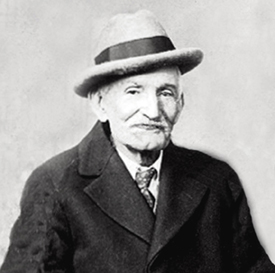I was saddened by the passing of Sue Eckstein this past June. She became an ardent supporter of my “Yesteryear” column by acquainting me with numerous local history sources, including a bulky scrapbook that once belonged to her father, Paul Carr, who with his brother, Sam, owned Carr Brothers, Inc.
One clipping in the massive well-worn musty volume dealt with the demise in Morristown of old-time Civil War fiddler, Uncle Am Stuart (Ambrose Gaines Stuart; Aug. 24, 1853 –Mar. 17, 1926). My great uncle, Fiddlin’ Charlie Bowman knew and highly respected the gifted musician.

Am, who was born in Bristol, TN., learned to play the fiddle at an early age, eventually acquiring a vast song repertoire ranging from the trauma of the Civil War to upbeat mountain tunes of indigenous Appalachians. The old-time musician began displaying his special brand of acoustical music to family members, Saturday night gatherings, county fairs and local fiddle contests. He later married Fannie Nelson of Morristown; the union produced three children.
Uncle Am came from a colorful family. His brother, George R. Stuart, was a well-known evangelist. He; Sam P. Jones, another renowned revivalist; and Thomas Ryman, a riverboat captain, joined forces to hold massive revival meetings in Nashville’s Union Gospel Tabernacle. When Ryman died in 1904, Jones and Stuart conducted his funeral service in the spacious building and on that same day renamed it the Ryman Auditorium, future home of the Grand Ole Opry.
Ambrose possessed a trait not usually found in celebrated musicians. He was unassuming, not bent on winning awards or receiving publicity. According to the article, “he devoted much of his time to playing the witching old melodies for the enjoyment of others and getting tremendous pleasure out of it himself.”
Stuart began his illustrious career with Vocalion Records and ultimately recorded sixteen 78-rpm records. Some of the tunes he played were “Old Liza Jane,” “Cumberland Gap,” “Grey Eagle,” “Forky Deer,” “Sourwood Mountain,” “Wagoner,” “George Boker,” “Leather Breeches,” “Dixie,” “Old Granny Rattletrap,” “Rye Straw” (aka “Unfortunate Pup”) and “Sally Goodin.”
For many years, Am was affiliated with the Mosler Safe Company. Just a short time before his passing, he was awarded first place in a contest in the nation’s capital that featured 26 of the best old-time fiddlers in the country.
Also, Am had just signed a contract to appear with the Swartmore Chautauqua, a Pennsylvania based traveling tent show that operated between 1912 and 1930. The offerings consisted of a combination of vaudeville acts, theatre productions, lectures from well-known people and Bible sermons from famous preachers of that era.
Stuart’s passing did not go unnoticed. Crowds of people who thronged the Morristown Baptist Church showed their appreciation for him at his funeral. The service was conducted by the church pastor, Rev. J. Harvey Deere and assisted by Rev. F.H. Hay of the Morristown Presbyterian Church and Dr. S.B. Vaughn of the nearby Methodist Church.
Perhaps the most eye-catching item at the funeral was a flora offering comprised of a huge basket of flowers that surrounded a decorated fiddle and a broken bow. Like the beloved acoustical stringed instrument that he loved so much, his music was silenced on that sad 1926 day. Fortunately, many of his records were preserved for future generations of music devotees.
I will further honor Sue Eckstein with additional material from her local history treasures in future columns.
